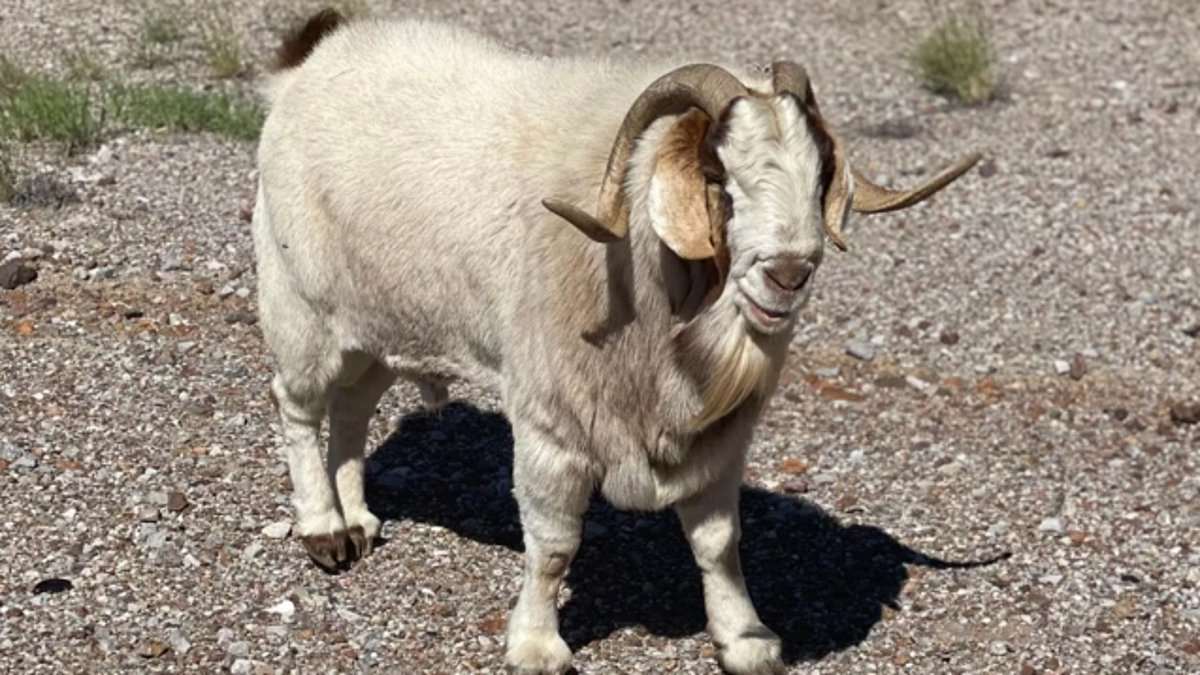A free-range mountain goat known to hikers and locals in the El Paso area as ‘Bob’ died after being roped in a relocation effort gone wrong.
The Texas Parks and Wildlife Department wanted to move the free-spirited roaming goat from his home in the Franklin Mountains to a local farm in an attempt to prevent disease in preparation for the upcoming release of desert bighorn sheep.
There were multiple failed capture attempts by wildlife officials at first and Bob was able to successfully escape from capture throughout the summer.
But he never ended up making it to his new home.
On August 13, wildlife officials decided to switch up the method for capture – and roped the goat.
Although roping animals is a standard practice in the livestock industry, it is what ultimately led to Bob’s death.
Bob died as what the wildlife department said is ‘an unfortunate and unintended result of the relocation effort’, KTSM reported.
The white and brown long-horn goat was living out his golden years – surviving in the wild on trees and grasses. But he may have not had many more years left.
He was at least nine years old, but suspected to have been much older. The lifespan of domestic goats in free-range settings is usually 10 to 13 years.
Froylán Hernández, the leader of Texas Parks and Wildlife Department’s Desert Bighorn Sheep Program, said that staff collected tissue samples from the goat after his untimely death to better understand the exact cause, according to El Paso Matters.
Staff also wanted to determine if a bacteria that causes infectious and fatal pneumonia cases in bighorn sheep is present in the Franklin Mountains.
But the nine-year-old goat was a staple to many wildlife lovers in Texas and his death is a reminder that he will no longer be visiting local residents during their walks or drives in the mountains.
When the El Paso Times posted on Facebook about his death, many users were upset and angry with the way his capture was handled.
One user commented: ‘So sad, I always looked forward to seeing him every day driving on Transmountain Road,’ accompanied with sad face emojis.
In 2015, The Texas Parks and Wildlife Department identified Bob as a domestic goat that turned feral. They believe that he likely escaped a farm or was intentionally set free from one.
At first, there was no intention of relocating Bob due to the difficulty and dangers it posed for both the animal and the wildlife officials.
But plans changed after the agency announced their new summer plans – repopulating desert bighorn sheep on the Franklin Mountains.
Bighorn sheep were nearly wiped out after disease and overhunting plagued the species. The project of re-introducing them to the mountains is part of a decades-long effort which aims to bring back the sheep to their historic mountain ranges in West Texas.
The bighorn sheep are vulnerable to a bacteria called Mycoplasma ovipneumoniae, or M. ovi, which is spread by wild and domestic sheep and goats and poses a fatal risk to desert bighorn sheep, Hernández added.
They decided that Bob posed too great of a danger, and that keeping him there would have jeopardized the successful establishment of the desert bighorn population in the mountains.
